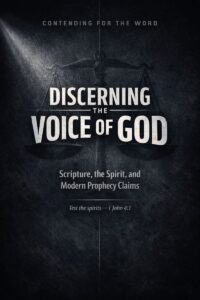⏱️ Estimated Reading Time: 3 min read
Why Calling Out False Teaching Is Biblical and Loving
Naming names is biblical, pastoral, and necessary when false doctrine threatens the health of the church. It protects the flock, warns the deceived, and distinguishes truth from error. When done with truth, clarity, and humility, it is an act of love—not division.
Some Objections
Some say calling out false teaching is fine—but naming names goes too far. Isn’t that unloving, judgmental, or harsh? Not if we follow the pattern of Scripture.
Examples in the New Testament
Throughout the New Testament, both Jesus and the apostles publicly identified false teachers:
- Paul called out Hymenaeus and Alexander for making shipwreck of the faith (1 Timothy 1:19–20).
- He warned of Demas, who loved the world more than Christ (2 Timothy 4:10).
- He opposed Peter publicly when he compromised the gospel (Galatians 2:11–14).
- John named Diotrephes, who rejected apostolic authority (3 John 9–10).
- Jesus Himself condemned the Pharisees and false shepherds in no uncertain terms (Matthew 23).
Why? Because souls are at stake.
Why It Matters Today
In an age of social media influence, podcasts, and bestsellers, false teaching spreads rapidly. If we only speak generally about error but never identify its source, people remain confused—or worse, deceived. They might follow wolves thinking they are shepherds.
Biblical love doesn’t stay silent. Love warns (Ezekiel 33:6; Acts 20:28–31). Pastors and leaders are watchmen—called to guard the flock, not merely to inform or entertain.
Naming names isn’t about ego, revenge, or nitpicking—it’s about clarity and truth. It must be done humbly, with evidence, and a willingness to be corrected if proven wrong. But to avoid naming names out of fear of backlash is to risk becoming complicit in the spread of error.
Cultural Note
In today’s culture of tolerance and platform-building, naming names is often seen as “divisive.” But Scripture tells us division comes from false teachers—not from those who expose them (Romans 16:17–18). True unity is built on truth, not silence.
Practical Wisdom
- Name names when the teaching is public, repeated, and unrepentant.
- Rely on primary sources, not hearsay.
- Avoid strawman arguments—address real theological positions.
- Make the truth more beautiful and compelling than the error is convincing.
Key Scriptures
- 1 Timothy 1:19–20 — Hymenaeus and Alexander
- 2 Timothy 4:10 — Demas, who loved the world
- Galatians 2:11–14 — Paul rebukes Peter
- Romans 16:17–18 — Mark those who cause divisions
- Acts 20:28–31 — Watch out for wolves among the flock
- Ezekiel 33:6 — The watchman’s responsibility
May the Lord give us courage, humility, and love as we contend for the faith once delivered to the saints.
For more Contending for the Word answers please visit us at Contending for the Word Q&A Archives
Dave Jenkins is happily married to his wife, Sarah. He is a writer, editor, and speaker living in beautiful Southern Oregon. Dave is a lover of Christ, His people, the Church, and sound theology. He serves as the Executive Director of Servants of Grace Ministries, the Executive Editor of Theology for Life Magazine, the Host and Producer of Equipping You in Grace Podcast, and is a contributor to and producer of Contending for the Word. He is the author of The Word Explored: The Problem of Biblical Illiteracy and What To Do About It (House to House, 2021), The Word Matters: Defending Biblical Authority Against the Spirit of the Age (G3 Press, 2022), and Contentment: The Journey of a Lifetime (Theology for Life, 2024). You can find him on Facebook, Twitter, Instagram, Youtube, or read his newsletter. Dave loves to spend time with his wife, going to movies, eating at a nice restaurant, or going out for a round of golf with a good friend. He is also a voracious reader, in particular of Reformed theology, and the Puritans. You will often find him when he’s not busy with ministry reading a pile of the latest books from a wide variety of Christian publishers. Dave received his M.A.R. and M.Div through Liberty Baptist Theological Seminary.




